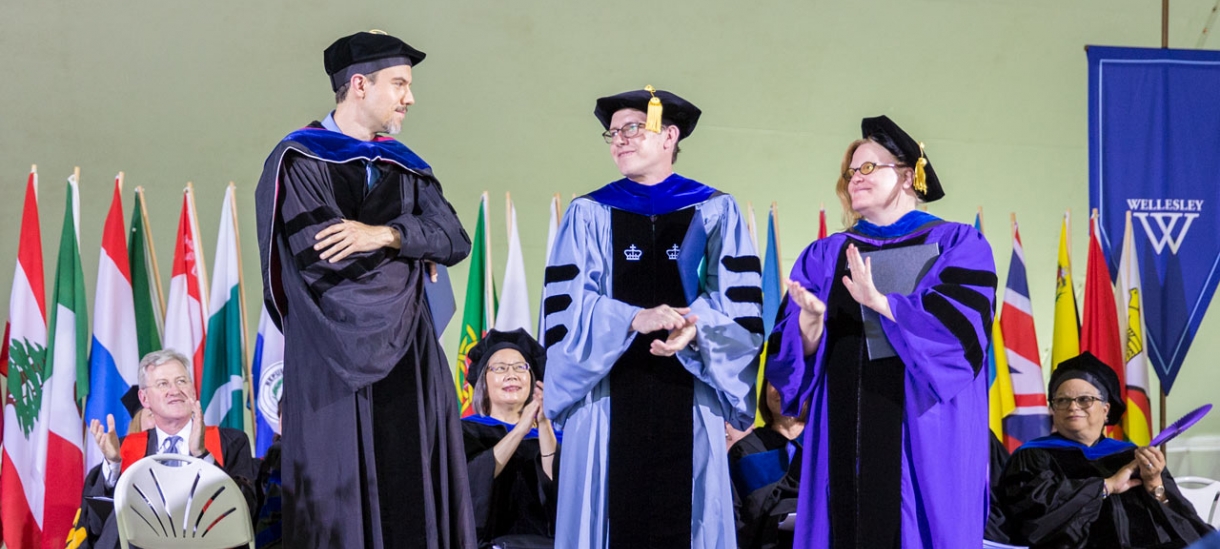
Citations for the 2018 Pinanski Prize winners
Jenny Olivia Johnson, associate professor of music
Associate Professor of Music Jenny Johnson combines her expansive knowledge of 20th-century music and 21st-century technology with a dedication to opening up new vistas of creative expression for every student.
For Professor Johnson, the classroom and performance space are places for students to challenge not only themselves but also the assumptions and pre-existing narratives of their fields. Professor Johnson widens and deepens the study of 20th-century music to include women and people of color. One student explained that “Her readings, listening examples, and lectures go beyond the standard narrative of 20th-century music.”
A cutting-edge composer, sound artist, and music scholar, she persuades students to reconsider what music and art can be and to “dismantle traditionalist music concepts ingrained into us.”
As many of her students attest, in her teaching Professor Johnson reaches well beyond the classroom to ensure that her students, no matter their technical background, have the tools, knowledge, and encouragement to pursue the projects they most care about. One student remarked, “She truly wants to bridge the gap between art and technology” and to make sure each student can realize her creative potential.
Students praise Professor Johnson for the countless hours she spends helping them write computer programs and set up complicated equipment, often for the first time, and guiding the process for their installations.
But she is perhaps most gifted at finding ways to tap into the powerful creative forces that lie within her students, to help them create the music that tells their individual stories. As one student beautifully summarized, Professor Johnson “showed me how the knowledge and skills we learned in her class could be used to create something beautiful and express sentiments that words can’t quite capture.”
For her ability to give every student the knowledge, tools, and support she needs to unleash her creative potential, it is an honor to present Jenny Johnson with the Anna and Samuel Pinanski Teaching Prize.
Paul MacDonald, associate professor of political science
When students take even a single course with Associate Professor of Political Science Paul MacDonald, they make a host of discoveries—they see new academic paths open in front of them, learn the keys to critical thinking, and gain insights into our increasingly complex world.
Professor MacDonald’s course topics range from leadership, to military strategy, to empires and imperialism, but, according to students, they share a common result. His classes, they say, make them better thinkers and communicators, stronger logicians and debaters, and more savvy “consumers of information.” He “deftly clarifies complex theories and concepts while encouraging [us] to think critically and ask [our] own questions,” said one. “When I read for his and other classes,” she added, “I…hear his voice in my head, asking, ‘What’s the logic here? What’s the counterargument?’”
Through a rich and rigorous study of political science, Professor MacDonald’s courses engage students with the world. He “combines historical and contemporary case studies with theory, revealing the enduring relevance and prescience of the study of political science,” as one student put it. He shows students “how U.S. foreign policy actions have real consequences for the people affected around the globe.”
Professor MacDonald inspires students to pursue a career path that sorely needs more women in its ranks. “His impact on my intellectual development is so strong that I consider him the major reason I plan, and have the confidence, to pursue a career in international security,” said one student, echoing many of her peers.
Students see him as an advocate and a mentor who wants them to succeed. Here is how one student put it: “[In his courses] he highlights women’s contributions to the literature and shows that he believes we can also make these types of valuable contributions to the field.”
For his ability to shape the keenest of thinkers and for his role in encouraging women to envision successful futures in political science and international affairs, it is an honor to present Paul MacDonald with the Anna and Samuel Pinanski Teaching Prize.
Wesley Andres Watters, Diana Chapman Walsh Assistant Professor of Astronomy
Professor Wesley Watters’ impact on his students is, quite literally, out of this world. The Diana Chapman Walsh Assistant Professor of Astronomy, Professor Watters, who recently received tenure, not only teaches the science of rockets and how to investigate the slopes of sand dune faces on Mars, he teaches resilience and perseverance in the face of challenge; teamwork; and how to “recognize the breadth of my capabilities.”
In courses that include Planetary Atmospheres and Climates and Hands-On Planetary Exploration, Professor Watters also teaches his students one of the most valuable skills for scientists and engineers: how to overcome unforeseen problems.
His students learn to work together as a team in project-based courses, such as one in which they must build a craft capable of making scientific observations as it explores Earth. “We learn to delegate, to set goals,” one student said, explaining “We learn to adapt and think on our feet. We learn to trust each other. We learn to trust ourselves.” Students praise his talent for “forming cohesive groups capable of taking on what are possibly the most complex and rigorous engineering challenges available at Wellesley.”
Professor Watters gives every student the knowledge and skills she needs to succeed as well as the confidence to believe in her own ideas. He works alongside his students, co-authoring major papers with them and preparing them to take on any challenge, from researching Martian meteorite impact craters to landing internships at places like NASA’s Jet Propulsion Laboratory.
His courses “merge mathematics, physics, engineering, astronomy, geology, climatology, computer programming, design, and fabrication into one intense course [where] everyone can be a scientist with a valuable skillset to offer,” one student summarized.
For his masterful way of widening science and engineering to encompass a world of other skills, it is an honor to present Wesley Watters with the Anna and Samuel Pinanski Teaching Prize.
